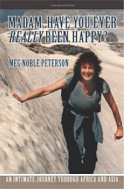As a parent, haven’t you found that, at times, even if something doesn’t work you keep doing it? How many of us would keep going down a dead end street in our car, expecting it to turn into a thoroughfare? Not many, unless we were seriously directionally challenged. A dead end is a dead end. So why, I ask myself, with all the indicators pointing toward that dead end, did I persist in forcing my children to take music lessons?
Well, I had this great old Weber grand piano that I traded for the spinet I won on television. It was so beautiful, so majestic. It was crying out to be used and appreciated. And I had all these memories of the days when I played duets and trios with my two sisters and participated in Mrs. Frair’s recitals to enthusiastic applause. It just didn’t get any better than that, starting with a simple rhythm band and growing into the complicated works of Bach, Chopin, and Rachmaninoff. I wanted my children to experience a similar feeling of pleasure and fulfillment over the years, and to enjoy music as I had. But it was my dream, not theirs. And they had other things to do. In my day we didn’t have as many diversions. I loved the piano and the violin. When asked by my mother to choose one and concentrate on it I was heartbroken. I had been on the verge of asking to take clarinet and cello as well. I was passionate about every instrument in the orchestra, except, maybe, the tuba.
Yes, music in all its forms was my enjoyment and my entertainment, and a huge part of my life. And has continued to this day. Now, all these years later, numerous studies point to the fact that playing an instrument challenges the brain and the body at the same time and can work wonders in forestalling both mental and physical aging. Trust me, I know. And the more I worked with children in the field of music education and music therapy over the years, the more I could see the positive influence of music on the development of the brain and the body.
Along with this passion for music, I was a master at shooting myself in the foot. Time and again. For example: The first rule of thumb is never to pound the side of the piano during a practice session and loudly proclaim, “I will not allow Beethoven to be played like that in my house!” Such action is a sure-fire way to turn your children off to music. I was good at it. Finally, my husband, after overhearing yet another traumatic practice session, came up with a suggestion. “Why don’t you just play your violin in the symphony and let the children see how much fun you’re having and they might want to do it, too.”
Or maybe, thought I, you might get up off the couch, put down your drink and your newspaper, and spell me so that I don’t get so frazzled. You could listen respectfully and quietly and let me move on to the next activity, such as supervising homework or preventing the little ones from drowning in the bathtub. Since he didn’t know much about music or have a stake in their success or enjoyment, it just might have worked.
I had a friend, Elaine, who also had five children, all of whom played either in the school band or orchestra. She was one of a handful of people I would call tone deaf, and the only person who could listen to a concert by the Lincoln Elementary School orchestra without wearing earplugs. A bonafide non-musical non-musician.
I was totally amazed at her children’s musical accomplishments. And a little envious. One day I asked her what she did to get her kids to practice and take such an interest in music. She looked at me and shrugged, “Well, I really don’t do anything. I just walk into the room when they’re practicing and say something innocuous like, ‘Oh, honey, that sounds wonderful!’ Whichever child it is smiles, and I leave. You know me. It really does sound wonderful. How could I tell the difference?”
Unfortunately, I was not easily assuaged. I lived by the caveat that in our house everyone would play a musical instrument. We’d start with the piano and branch out with the instrument of their choice. But if they chose it, they also had to practice it. “Music is a tradition in our family,” I would say ad nauseam. I learned this pronouncement from a child psychologist who had no children.
By the time I reached number five I was running out of steam. I was swimming upstream, but refused to die. The other four had soldiered through piano lessons and Martha even played the violin because, she told me later, it gave her a chance to be alone with me. Yes, those were busy days and I was not always available.
But in all fairness, she was able to go into New York City every week for dance lessons, and we shared a great many Broadway musicals over the years. That counts, doesn’t it? And as I mentioned before, I always wondered if her love of music had to do with the fact that I danced around the living room to My Fair Lady and Guys and Dolls while she was in utero, and nursed her to the rich strains of Mozart and Beethoven.
Meanwhile, back to Robert. He had a lot of ability I was sure, and only lacked perseverance. Being hyperactive, he was much more interested in contact sports than practicing a musical instrument. No problem. I could deal with that. So he dutifully tried the piano, the clarinet, and the trombone. He had a good ear and could play the trombone from the beginning. But, then, he was only twelve years old and there was practice….
My schedule of ferrying five children to various lessons each week was a burden I gladly accepted. Seems that there were very few teachers living in our town, but I would not give up.
At this point my husband and I owned a musical instrument company and I did workshops and conventions around the country. During one of these I met the makers of Ludwig Drums and did some horse-trading, which ended up with my returning home with a full set of drums. Eureka! I knew I had found the perfect instrument for Robert. What kid did not love to pound on a drum and bang the cymbals?
But now my musician’s brain took hold. I must find the right teacher. Young, personable, and knowledgeable in music theory and the classical repertoire.
I talked to Robert before his first lesson. “Rob, you are really going to love Mr. James. He’s such a good drummer. But you have to understand something. You don’t just sit there and bang away. You have to learn timing and music theory and the intricacies of handling the sticks. It’s not just play. It takes discipline.”
Robert looked at me and without missing a beat said, “Mom, I’ll do my best, but if it’s too difficult I’ll take up the cello.”
Serves me right! But in my defense, I did not limit myself to classical music. I was well-versed in popular music, which I used in my workshops all the time. And how many mothers can say they introduced the Beatles to their children? Give credit where credit is due!
Years later I realized that I wasn’t a total failure in introducing the delights of music to my children. Martha is an avid singer and even plays the piano when one is available, and Tom took singing lessons and is also a real admirer of YoYo Ma. I gave him an upright piano when he was in college, which he sold within the year. Now maybe it’s time to buy him a cello.

